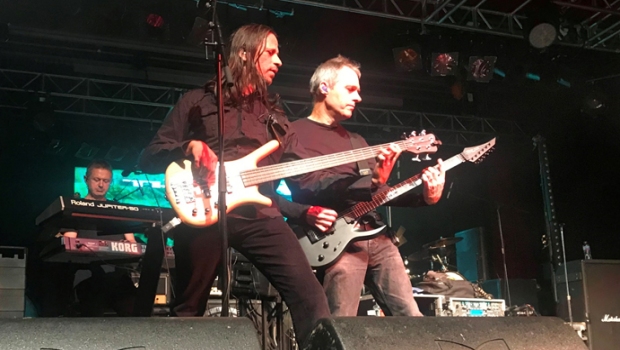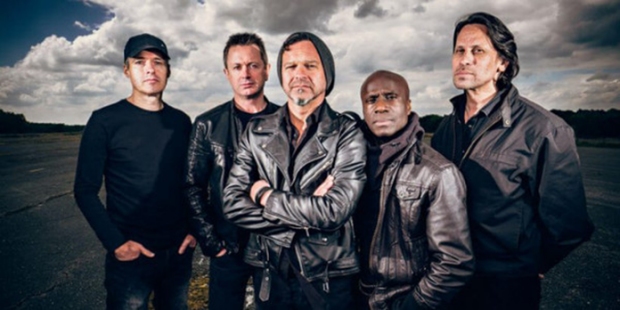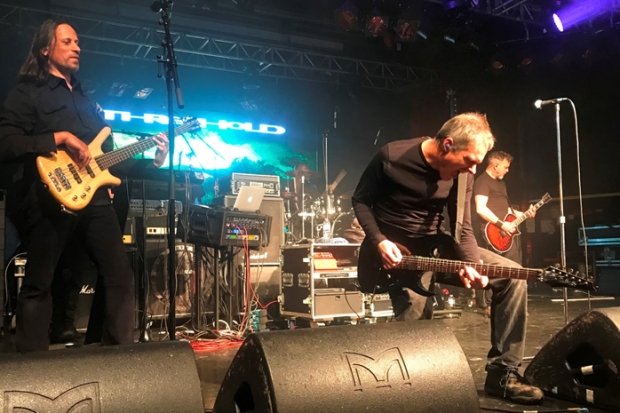Karl Groom, lead guitarist and driving force behind the UK’s premier prog-metal band, Threshold, since 1988, spoke to TPA’s David Edwards before the band’s return to live performance at HRH Prog X at Sheffield on September 4th, 2021. Karl, a well-regarded music producer at Thin Ice Studios, spoke eloquently and extensively about his experiences during the pandemic, the departure of lead singer Damian Wilson back in 2017, future album plans, how the band started, the difficulties of touring in a post-Brexit Europe and the re-issue of the Surface to Stage live CD…
Thank you, Karl, for taking the time to speak to me before Threshold’s performance this evening. I suppose the place to start is with what you’ve been up to over the last 18 months or so during the pandemic?
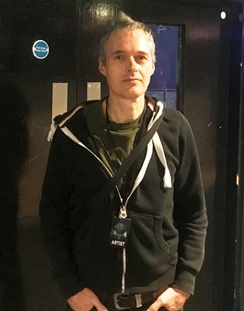 Well, I’m a producer. I work in a studio in the Surrey area (Thin Ice Studios in Virginia Waters) near to my house, and I was able to travel there every day and work for bands out of the country. Several new bands and I think I did some stuff for Yes at that time, I think, with the tracks from the last album after Chris Squire died. With some other bands I had a session drummer come in, for example, to work with, and then I had a lot of mixing working to do as well. So, I kind of had my time reasonably catered for, thankfully.
Well, I’m a producer. I work in a studio in the Surrey area (Thin Ice Studios in Virginia Waters) near to my house, and I was able to travel there every day and work for bands out of the country. Several new bands and I think I did some stuff for Yes at that time, I think, with the tracks from the last album after Chris Squire died. With some other bands I had a session drummer come in, for example, to work with, and then I had a lot of mixing working to do as well. So, I kind of had my time reasonably catered for, thankfully.
However, although I see a lot of the family there, when I’m at work I normally see musicians or maybe another producer, etc., and work with them. So not having them around has been a bit soulless – sitting in front of a computer and not a great deal to put on software. At the moment, I have Clive Nolan of Pendragon working upstairs in his production suite on a number of different projects, while I’m in the studio downstairs. So, we would see each other once a day, at least for some company and just to speak to somebody. So at least we’d have half an hour chatting. It’s difficult because you are so used to people passing through the studio and you don’t realise you’re going to miss that at the time, I suppose.
But the main thing I’ve missed was with Threshold – as we do so many live shows. I think the last show we did was in Madrid in the middle of October 2019 and that was the last time I saw my bandmates. I said goodbye at the airport, thinking we’d see each other in a couple of months and do something and then that was that! We were supposed to go to Australia for our first ever tour there. Then we were supposed to come back to a German tour. And then we were meant to go on tour with Evergrey as well. And all these things just got cancelled. It was going to be a really busy time and losing all those live events was the saddest thing for me, because they will never come back.
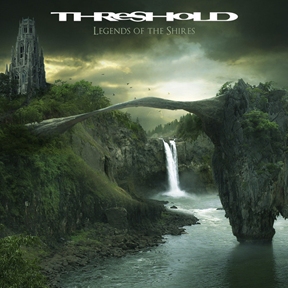 And the fact that you were on a roll with your well-received Legends of the Shires album, which saw some of your best chart places and critical acclaim ever, must have made it very frustrating.
And the fact that you were on a roll with your well-received Legends of the Shires album, which saw some of your best chart places and critical acclaim ever, must have made it very frustrating.
It was our biggest album to date – doing even better than Dead Reckoning. The record company were pleased, and we never ran out of offers to do more shows. It was constant, which is great, but we were never able to have time to get around to doing a new album. So, funnily enough when all this free time came around it was a kind of blessing, as we’ve now got a new album pretty much finished.
[Read Rob Fisher’s review of Threshold’s Legends of the Shires album from August 2017 HERE on TPA]
Legends of the Shires was the album that had Glynn Morgan back in the band on vocals and guitar, replacing Damian Wilson. I imagine that must have been a difficult change, but I thought the recent photo of Damian and Glynn sort of touching elbows at the studio was a nice one to see. Do you think things have settled down amicably now?
Damian’s obviously in Clive’s band, Arena, and of course, we’re working in the same place. So, I see Damian quite regularly. So, we broke the ice, I don’t know, maybe a year or so ago. And I sort of met him and we have always got on well, apart from during the end of his time with Threshold. I think Damian was kind of wanting to move on. If you look at what he’s done over the years, you’ll see he never stays in one band very long and he was with us for nearly a decade. I do think he just got itchy feet and really wanted to do something different. For me, I think we get on better now, but I think it was difficult at the time.
 Whenever you split up with someone in the band it is going to be difficult – either one person feels rejected or the other one does. But it just started to be that every time we wanted to do something, we couldn’t really meet up to discuss it, or perhaps he wasn’t available, and I just felt nothing seemed to work any longer. We couldn’t get in at the right time to record and then he did come in to record later. Richard [West, keyboards] and I felt we’d written some of our best work for over a decade and we were really pleased with it. And we just felt something wasn’t quite working. It wasn’t specifically Damian’s fault either. It just wasn’t quite happening. Another time, he said he wanted to leave, but then changed his mind – so I eventually spoke to him and just said, you know, do you really want to be in the band? He said no and then he came back later and said yes. I kept going backwards and forwards. I think that’s probably why he felt rejected and upset in the end, because we said the band has got to move on and do what we’re doing. I don’t like being in confrontation, so luckily when Damian came to the studio it allowed me to get back in contact. That felt really good and now we get on fine.
Whenever you split up with someone in the band it is going to be difficult – either one person feels rejected or the other one does. But it just started to be that every time we wanted to do something, we couldn’t really meet up to discuss it, or perhaps he wasn’t available, and I just felt nothing seemed to work any longer. We couldn’t get in at the right time to record and then he did come in to record later. Richard [West, keyboards] and I felt we’d written some of our best work for over a decade and we were really pleased with it. And we just felt something wasn’t quite working. It wasn’t specifically Damian’s fault either. It just wasn’t quite happening. Another time, he said he wanted to leave, but then changed his mind – so I eventually spoke to him and just said, you know, do you really want to be in the band? He said no and then he came back later and said yes. I kept going backwards and forwards. I think that’s probably why he felt rejected and upset in the end, because we said the band has got to move on and do what we’re doing. I don’t like being in confrontation, so luckily when Damian came to the studio it allowed me to get back in contact. That felt really good and now we get on fine.
Tonight’s show, I imagine, will have a similar setlist to when things ground to a halt almost a year and a half ago – focussing on Legends of the Shires, with some older songs thrown in too. However, it’s easy to forget that it came out almost exactly four years to the day. How are things progressing with the new album at present?
The vocals are all done. I’ve a few guitar solos left to do, or do again, because I didn’t like what I’d done when I reviewed. I also found some acoustic music I’d forgotten yesterday. We’ve got all the bass to do, as Steve wasn’t available, and maybe a bit of keyboards, but that’ll get done in the next few weeks and then I’ll be ready to mix it all. The only downside is that our record company, Nuclear Blast, always need about five months lead time these days – which means when you hand your album in to them, it won’t be released for five months, largely due to vinyl cutting, I think. So, you have to release in sync with all the products and vinyl is pretty popular and certainly forms a large part of the physical release. As a result, we are probably looking at a spring release now. We’ve got a provisional title linked to some of the lyrics, but we often change our minds. We thought we might do a follow-up to Legends but then we thought that might be too contrived, so we’ll see.
Is that style of heavier songs mixing with lighter ones, and that balance between metal and prog, going to be maintained – or can we expect changes?
I don’t know really. I’m never a very good judge of it really, until my wife forces me to listen to it! All I can say is that on Legends of the Shires it was very much an organic process. We didn’t plan on a double album. We just kept going as Richard and I still have more and more ideas. We just said let’s keep writing until we run out of ideas and see what’s there and we planned to cut it down to a single album – but the quality of what we had we thought was really great. We had this running theme which went through the album, but then we had other songs, so it was all carefully put together – with many of them having dual meanings. Steve [Anderson, bass] wrote a song (On the Edge) and he’d never written before – so we wanted to include that too.
Do you see Threshold having a particular style or is it very much an organic process with yourself and Richard along with the rest of the band? What was your thinking when you launched the band all those years ago, back in 1988?
I suppose, looking back, we just couldn’t hear the kind of music we wanted to hear – myself, John Jeary and Nick Midson. So, we’re writing music and, you know, John particularly liked Rush and Genesis and bands like Pink Floyd, and Nick and I liked the more basic style of Testament and Metallica, I suppose. I also started working with Clive and he was introducing me to a lot of progressive music. So, I suppose I started to appreciate John’s opinions more, and we sort of thought – well, if we’re going to make a band, let’s make it play a mixture of the music that we like and start from there. And that’s sort of roughly how it happened – our poor attempt to imitate Genesis and Testament!
We had a lot of aborted songs in those days as we played in pubs and clubs. But then into the early ’90s we began to make a more concerted effort to be more mature with our lyrics, as John had started to show what a very talented lyricist he was – making us realise we had to up our game. I think the first example of what we were doing at a time was a song called Endless Sea – which was on one of our demo tapes, and then on one of our fan club albums, Replica, I think – which we recorded years later. And that sort of transitioned into a song that was on Psychedelicatessen. We just started creating this kind of mixture of progressive and heavy as we saw it. There was no real genre of progressive metal music. The only indication of that sort of thing at that time was Queensrÿche, I suppose.
We did a compilation track for SI Music in Holland and as a result of that we got signed to a small label in the UK, GEP (Giant Electric Pea) run by Martin Orford of IQ, along with Mike Holmes. It was primarily a label for IQ and I think we did four albums with them. On their first album, they said to us, “look, guys, you know, we’ll give you a bit of money to make the album and if you could sell 500 copies, we’ll be happy”. Well, within a few months, we’d sold 15,000 – and they were over the moon, and that set us on tour and it’s basically when it all started. We eventually moved to InsideOut in 2001 for Hypothetical. They did a lot for us, so I can’t complain, but eventually there were a few things I wasn’t quite sure about. A friend of mine, a guitarist in the symphonic metal band Edenbridge, said I’ve been speaking to Nuclear Blast trying to get my band signed to them and he said they were very interested in signing Threshold. He said the label are really after you and if you’d like to sign, you could probably name what terms you want! So, I contacted them and Marcus, who owns the label, was indeed interested in signing us – and it was a big deal because they were a considerably bigger label and I wanted to move on. They had a good reputation, which I still believe in today. You know, it’s the first label I’ve ever heard of every band being really happy with. We’ve been with them ever since. We signed a new deal which started with Legends of the Shires and we’ve got another three albums with them.
That’s really great to hear, Karl. Regarding live gigs – any plans for a UK tour in the foreseeable future?
Our agent is talking about trying to book shows for next year. I think in the UK it’ll be alright, but the problem is that things are still difficult as we still have a pandemic, so you don’t know what the situation might be in a venue. It’s not the health issue – it’s the fact that some venues in Germany were limiting their crowds to 50%. If you play a venue with 600 people and it’s limited to 50% or even 25% limit, the numbers don’t add up, you can’t afford to tour based on that. Then there’s the Brexit problem – that was a kind of disaster. You’ve got ‘cabotage’, which means that a band leaving the UK can only do two days before you have to return to the UK and then drive out again. You have to keep crossing the channel to do a tour! Then there’s the issue of visas. Although they say it is okay, there were different restrictions in every country. And then you need a ‘carnet’, which means you have to label every single piece of equipment you carry with serial numbers, value, and origin of the receipts. And you have to present that into every country you go into. And if you need the visas – well, for example, Spain, at the moment, is like 400 euros per person to get into the country to work. We actually thought about just going to Germany and then stopping next to Holland, then stopping next to Italy, so people could come over the border to see us and it would be the cheapest option. We’d love to be on tour again, including places like Canada and Australia, but things need to clear up. We love travelling and it’s obviously a large source of income for the band.
The funny thing is, we thought we were going to lose a lot of our income because CD sales dropped. However, even though it’s a pretty raw deal at times on streaming, royalties do come from streaming to some extent. I never thought I would tell anybody this, but in the last three years, I think a large amount has come from that side.
From a personal basis, I have the studio work to keep me going, which is a good safety net, and keeps me working within music. For the other guys, Steve and Johanne [James, drums] both work in music – they are teachers. Richard does a bit of music and also works in acoustics, and he’s working in electronics, which isn’t so far away, I suppose.
In terms of the band line-up, is it going to be the same for the next album?
Yes, indeed. This is the smoothest it seems to have been for a while. We’ve done a lot of shows and so it’s been fully tested. It is the case that the more band members you have the more difficult it is to organise things, such as flights, recording, etc. Just by having one less person in the band, it does help. Pete Morten, our other guitarist, left a few weeks before Damian did. We planned to organise a short tour with Damian to see if it could work as a 5-piece with one guitarist and for many reasons we couldn’t seem to make it work or arrange it – and then he left. So, when Glenn came, we got a singer/guitarist to replace a singer and a guitarist, and it’s worked really well. He’s very good – he plays guitar in his own band, Mindfeed. When we need two guitars, he just picks up his guitar and that’s great. I’ve always like bands like that, so it’s worked out really well.
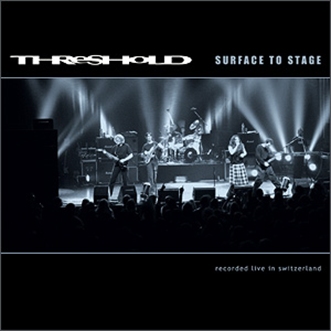 l see you have just reissued the live Surface to Stage CD with your late vocalist ‘Mac’ (Andrew McDermott).
l see you have just reissued the live Surface to Stage CD with your late vocalist ‘Mac’ (Andrew McDermott).
It was always something I was a little disappointed about. It was all a bit of a rush at the time, I think, and we could only do one CD, so it had to be cut down. It was about two years ago that I was talking to a fan who was at a gig in Canada, and I mentioned that I’d found these two extra tracks – which I’d mixed because I was thinking that Mac’s 10th anniversary was coming up and we wanted to put something up to remember what an amazing person he was. Richard then said he still had footage from one of the songs (Fragmentation) and we found we had dual camera footage from the same venue. So, we put together this package and I thought well, I might as well do the third track and mix that too. Richard then said why not try putting it out as a double release. I said, great – I can then update it and spend a bit more time and sort out some guitar tones and other things. Then we thought the booklet could be improved with some better pictures and I think now we’ve got a really great product!
Thank you for your time, Karl. I’m looking forward to seeing your return to the stage tonight and all the very best for the Surface to Stage re-issue, the new album in the Spring and hopefully a return to touring in the months to come.
I’ve enjoyed it. Thank you and take care yourself.
Photographs and images by David Edwards and Threshold.

